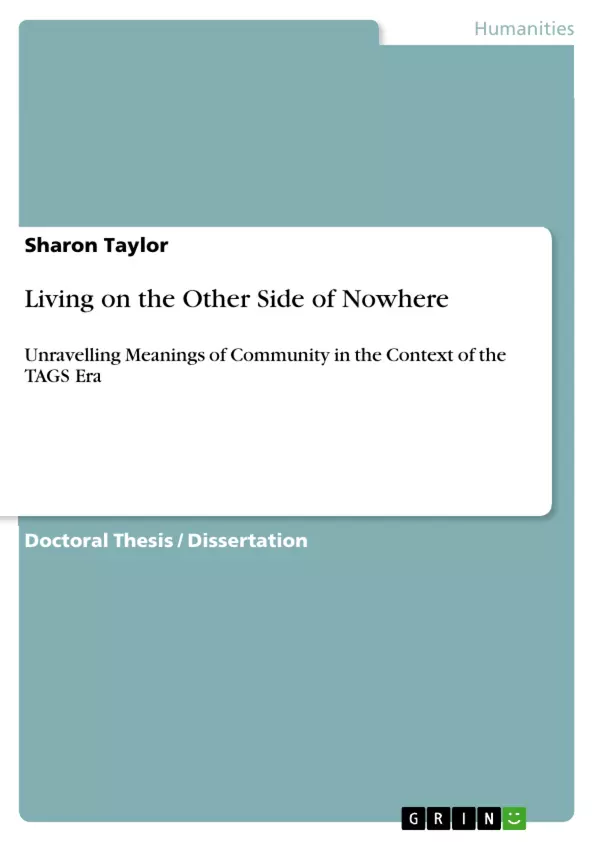Much scholarly work has centered around community in Newfoundland and Labrador. However, comparatively little work has focused on meanings of community. This thesis compares meanings of community in everyday life for people living in a Southern Shore community on Newfoundland's Avalon Peninsula, with the meanings found in scholarly literature and in government documents produced in association with The Atlantic Groundfish Strategy (TAGS). TAGS was a federal adjustment program responding to the moratoria on groundfish fishing in Atlantic Canada in the 1990s. I draw on Dorothy Smith's feminist theory, which starts from "lived experience" as well as the socioeconomic context of that lived experience as an entry point to illuminating the ideological nature of documents and their links to ruling relations. Smith's discussion of ideology and ruling relations are central to my gender-informed and mediated framework. I explore the contrast between meanings of community in TAGS documents and expert texts looking for lines of fault between these texts and meanings of community in everyday life in a fishing community in Newfoundland.
I use as well Smith's notions of resilience and emergent consciousness to demonstrate that the historical oppressive practices of the ruling group are re-mobilized in TAGS, reflecting society's patriarchal and capitalist ideology generally, and government ideology more specifically. I show the insight of ordinary social actors into the conditions of their existence. My argument is that these concepts are integrally related to community research and policy development.
The research shows that the meanings of community in one community is partly organized by history, geography and gender, and by religious, economic and political regimes. This thesis concludes by exploring the implications of these interpretations for community research and policy development.
Inhaltsverzeichnis (Table of Contents)
- Introduction
- Community in Newfoundland and Labrador
- The Atlantic Groundfish Strategy (TAGS)
- Dorothy Smith's Feminist Theory
- Method and Methodology
- Meanings of Community in Everyday Life
- Resilience, Emergent Consciousness and the Ruling Group
- Community and Policy Development
- Conclusion
Zielsetzung und Themenschwerpunkte (Objectives and Key Themes)
This book investigates meanings of community in a Southern Shore community on Newfoundland's Avalon Peninsula, comparing them to those found in scholarly literature and government documents related to The Atlantic Groundfish Strategy (TAGS). The study aims to illuminate the ideological nature of these documents and their connections to ruling relations, drawing on Dorothy Smith's feminist theory and a gender-informed, mediated framework.
- Meanings of community in everyday life
- The role of ideology in government policies and documents
- The impact of TAGS on fishing communities
- Resilience and emergent consciousness in the face of social change
- The intersection of history, geography, gender, and social regimes in shaping community
Zusammenfassung der Kapitel (Chapter Summaries)
- Introduction: This chapter introduces the book's focus on meanings of community in a Newfoundland fishing community, highlighting the gap in existing research on this topic. The book uses Dorothy Smith's feminist theory to analyze the ideological nature of government documents and their relationship to lived experience.
- Community in Newfoundland and Labrador: This chapter examines previous research on community in Newfoundland and Labrador, outlining the historical, social, and economic context of communities in the region.
- The Atlantic Groundfish Strategy (TAGS): This chapter provides an overview of the Atlantic Groundfish Strategy, a federal program responding to the groundfish moratoria in the 1990s. It explores the role of TAGS in shaping the lives of people in fishing communities.
- Dorothy Smith's Feminist Theory: This chapter introduces Dorothy Smith's feminist theory, focusing on her concepts of "lived experience," ideology, and ruling relations. The chapter explains how Smith's theory provides a framework for understanding the relationship between government documents and everyday life.
- Method and Methodology: This chapter describes the research methods used in the study, including participant observation, interviews, and document analysis. It outlines the ethical considerations involved in the research.
- Meanings of Community in Everyday Life: This chapter analyzes the meanings of community as expressed by residents of the Southern Shore community. It examines the ways in which residents define and experience community, drawing on their lived experiences and perspectives.
- Resilience, Emergent Consciousness and the Ruling Group: This chapter explores the concepts of resilience and emergent consciousness, arguing that these concepts are crucial to understanding the ways in which communities respond to and resist oppressive practices. It examines how the ruling group's historical practices are re-mobilized in TAGS.
- Community and Policy Development: This chapter analyzes the implications of the study's findings for community research and policy development. It discusses the importance of incorporating local knowledge and perspectives into policy decisions.
Schlüsselwörter (Keywords)
This book focuses on the meanings of community, lived experience, feminist theory, ideology, ruling relations, The Atlantic Groundfish Strategy (TAGS), resilience, emergent consciousness, Newfoundland, and fishing communities.
Frequently Asked Questions
What is the focus of "Living on the Other Side of Nowhere"?
The thesis compares everyday meanings of community in a Newfoundland fishing village with those found in scholarly texts and government documents related to TAGS.
What was The Atlantic Groundfish Strategy (TAGS)?
TAGS was a federal adjustment program in the 1990s designed to support Atlantic Canadian communities affected by the groundfish fishing moratoria.
How does Dorothy Smith's feminist theory apply here?
The study uses Smith's theory to explore "lived experience" and reveal the ideological nature of government documents and their links to "ruling relations."
What are "ruling relations" in this context?
They refer to the administrative, managerial, and professional practices that organize and control social life, often reflecting patriarchal and capitalist ideologies.
What role do resilience and emergent consciousness play?
These concepts demonstrate how ordinary people understand their conditions and resist or adapt to oppressive practices imposed by government policy.
- Citation du texte
- Sharon Taylor (Auteur), 2001, Living on the Other Side of Nowhere, Munich, GRIN Verlag, https://www.grin.com/document/177413



